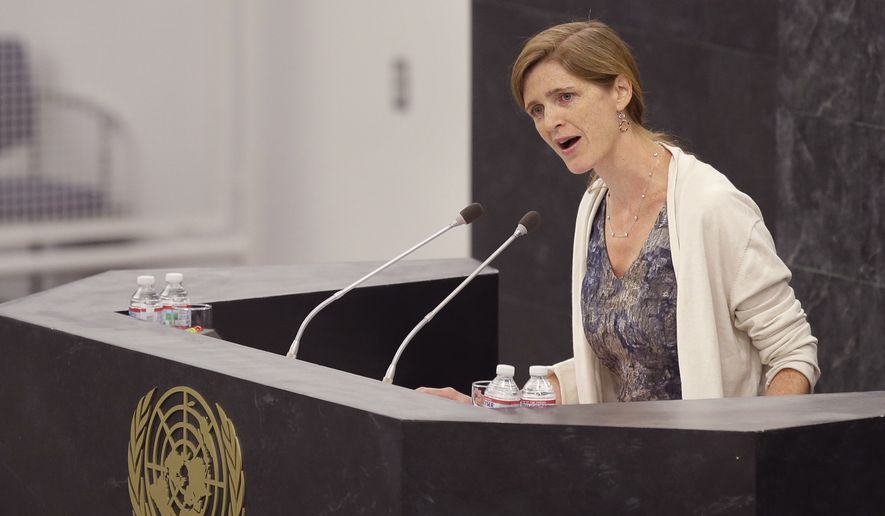The U.S. ambassador to the United Nations said Sunday that the Obama administration has a legal basis to conduct airstrikes in Syria without U.N. approval, raising questions about the White House’s ability to form an international front against the Islamic State.
“Consistent with the U.N. charter, we — it will depend on the facts and circumstances of any particular strike in Syria, but we have a legal basis we need,” Samantha Power said on ABC’s “This Week.”
No country has agreed publicly to join the United States in launching airstrikes in Syria against Islamic State targets, and the Syrian government itself has refused to authorize outside strikes on its territory even against Islamist rebel groups that it is fighting itself.
But Ms. Power predicted Sunday to host George Stephanopoulos that U.S. forces would not act alone in an air campaign.
“I will make you a prediction, George, which is that we will not do the airstrikes alone, if the president decides to do the airstrikes,” Ms. Power said.
She pointed out that the U.N. Security Council adopted a resolution Friday condemning terrorist organizations such as the Islamic State and calling for member states to aid the Iraqi government’s efforts to combat the militants.
“So they have made an appeal to the international community for collective defense. And we think we have a legal basis we need if the president decides” to proceed with airstrikes in Syria, Ms. Power said.
President Obama is scheduled to appear before the U.N. General Assembly this week to push his case for strong international response to the Islamic State, which has drawn worldwide censure for its savage tactics that include the videotaped beheadings of two American journalists and a British aid worker.
Ms. Power stressed that the administration does have international support to counter the Islamic State. At Friday’s meeting of the U.N. Security Council, “more than 40 countries spoke in support of our efforts,” she said.
The Obama administration has not named the 40 countries involved in the coalition or offered specifics about their roles, although Mr. Obama praised France for conducting airstrikes last week on a terrorist-held logistics depot in Iraq.
French President Francoise Hollande said afterward that he would not attack targets in Syria, according to The Associated Press.
“[W]e’re going to leave it to other nations to announce for themselves what their specific commitments to the coalition are going to be,” Ms. Power said on the CBS program “Face the Nation.”
Critics have raised doubts about the administration’s ability to form an effective global coalition. Social media websites are rife with comments challenging the administration to name the 40 countries.
Rep. Mike Rogers, the Michigan Republican who heads the House Permanent Select Committee on Intelligence, suggested that factors may include Mr. Obama’s past unwillingness to become entangled in international conflicts and his presidential win based in significant part on his opposition to the Iraq War and vows to pull U.S. fighting forces out of Iraq and Afghanistan.
“The Arab League Partners came to us a couple years ago and said, ’Mr. President, we need some help on fighting extremists in Eastern Syria.’ The president said no. The terrorists said yes. Now they hold land about the size of Indiana in Eastern Syria, in Iraq,” Mr. Rogers said on “Face the Nation.”
Mr. Rogers gave another example involving Ukrainian President Petro Poroshenko, who spoke Thursday to a joint meeting of Congress. The Obama administration agreed to provide $53 million in humanitarian and nonlethal military aid, but not weapons, to Ukraine in its standoff with Russia. Mr. Poroshenko dryly noted that “one cannot win [a] war with blankets.”
“Poroshenko came to the United States of America, gave an inspirational speech about standing up for liberty. Used our revolutionary motto, ’Live free or die,’” Mr. Rogers said. “The president said no, the Russians said yes. And so we’ve got to change this.”
Ms. Power emphasized that there is strong local support in terms of “the commitment of the Iraqis, the Kurds, and the Syrian moderate opposition, which has been fighting ISIL for nearly a year, and has been appealing for outside help.”
“[L]ocal forces are always going to be your best bet fighting ISIL in a country that of course belongs to the Iraqis, the Kurds, and in this case of Syria, the Syrians,” Ms. Power said.
Secretary of State John F. Kerry said Friday that there is a role for “nearly every country in the world to play, including Iran,” in the fight against the Islamic State, but Ms. Power said the Obama administration is “not coordinating with Iran.”
“We are not sharing intelligence with Iran,” Ms. Power said. “Iran has said that ISIL is its enemy, but by the same token Iran has supported Hezbollah and the Assad regime [in Syria].”
Iranian President Hassan Rouhani denounced the Islamic State’s savage tactics, including the beheadings of journalists, but also called the U.S.-led coalition against the terrorist group “ridiculous” in an interview last week with NBC News.
• Valerie Richardson can be reached at vrichardson@washingtontimes.com.




Please read our comment policy before commenting.